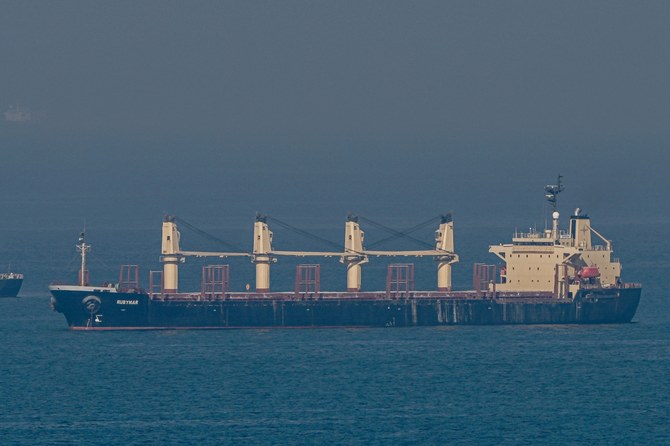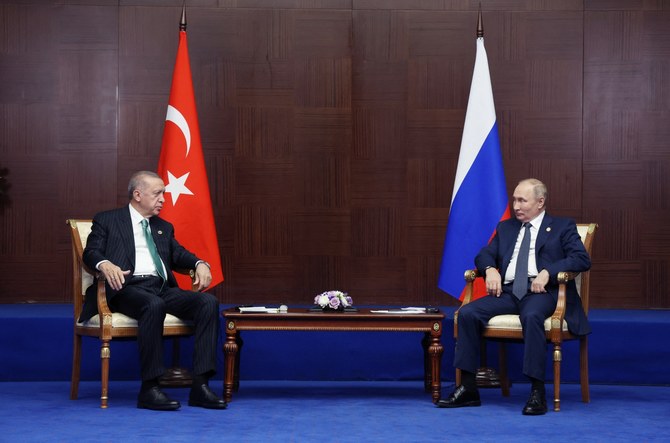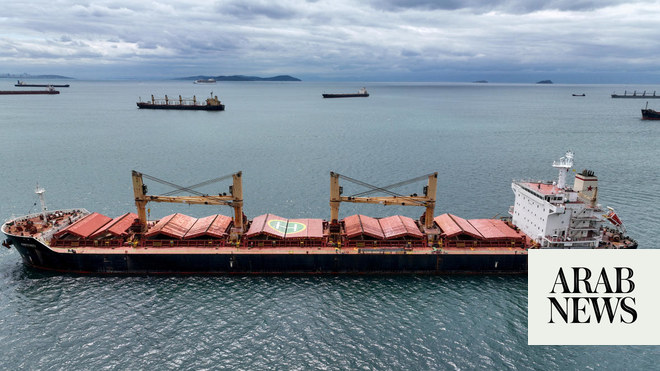
It remains to be seen whether Russia will relent and extend the Black Sea grain deal that allows Ukraine to safely transport grain to the world. The deal expires on May 18 and the UN, Turkiye, Russia and Ukraine are currently in negotiations to extend it. Diplomacy is not being helped by Russia refusing to register — and therefore blocking the passage of — 90 ships that are waiting to dock in Ukraine, two-thirds of them empty and waiting to be filled with grain. The US and UK have condemned Russia for using people’s starvation as a leverage point to get what they want in the discussions.
While the majority of grain goes to China, Turkiye, Italy and Spain, not a small amount goes to Egypt (1.2 million tons), plus smaller amounts to Saudi Arabia (180,000 tons), Yemen (260,000 tons), the UAE and Oman. Any reduction in supply would cause the price of grain to rise even higher globally, regardless of the destination. And the people of Egypt and Yemen are already struggling with food and living costs. In all, 16 million out of 28 million tons of Ukrainian grain currently goes to developing countries, including 72,000 to low-income countries.
Russia claims it will reestablish the grain deal in exchange for a reduction in European sanctions that are blocking Russia’s agricultural industry (such as crops and fertilizers), including allowing the Russian Agricultural Bank access to the SWIFT financial communication system, used globally by banks, and the removal of sanctions on agricultural business accounts.
The deal was originally brokered in July last year by the UN and Turkiye, but it was briefly suspended on the Russian side in late October. The deal permits a team of officials from the UN, Turkiye, Russia and Ukraine to inspect all ships docking at, and leaving, Ukrainian ports. This is to reassure Russia that weapons or other non-agreed items are not being transported. Once they have cleared the inspection, the ships are given safe passage through the Black Sea. In exchange, the West agreed not to sanction, or encourage the sanction of, Russia’s exports. While the export of Russian crops and fertilizers is not directly sanctioned, the actions against the country’s banking, logistics and insurance sectors have impacted their ability to sell and transport their products.
At a time when there are countries experiencing extreme shortages of food, grain supply is critical
Dr. Bashayer Al-Majed
The deal is vital, as Ukraine provides a significant proportion of grain (wheat, barley and corn, as well as nearly half the world’s sunflower oil exports) to countries all over the world. Russia and Ukraine between them provide a third of the world’s wheat. At a time when there are countries experiencing extreme shortages of food, such as Yemen and those in the Horn of Africa, grain supply is critical. Even more so as economies everywhere are struggling as a result of COVID-19, rising fuel prices and inflation.
A reduction in supply would not only be problematic for the countries that would subsequently fail to receive the grain, but it would also push up the price of grain everywhere, across all grain types. For example, if people were unable to get wheat but could get oats, they would buy what they are able to, thus increasing demand and allowing suppliers to push up prices.
Although the teams, minus Russia, have remained to inspect ships, without Russia’s backing the insurance costs for shipping in the Black Sea will increase rapidly. There are reports that, understandably due to the war, Ukrainian farmers have been unable to plant the same quantity of crops, which may lead to a deficit in the coming years.
Positively, wheat futures (prices) have hit an annual low. The grain deal has maintained a supply to the world, easing prices, while Russia also has a backlog of wheat stock, 80 percent greater than usual. This means prices have been lowered in an attempt to clear the existing stock ready for the next harvest. But this lowered price may not last. Blocking the deal and the export of grain also harms Russia, which generally has four bushels of wheat to export for every one of Ukraine’s. Signing the grain agreement would be in Moscow’s interest. Ukraine has also stated that it has other routes, aside from the Black Sea, to transport grain to the world if needed.
Meanwhile, the war in Ukraine has pushed the Egyptian government to work toward ensuring greater self-sufficiency, which also aligns with its Vision 2030 strategy. Prior to the Russian invasion of Ukraine, Egypt imported 60 percent of its wheat, with nearly 50 percent of that coming from the warring countries.
The war in Ukraine has pushed the Egyptian government to work toward ensuring greater self-sufficiency
Dr. Bashayer Al-Majed
Egypt has an extreme poverty rate of 32.5 percent, rising to 66.7 percent in more rural areas, as of the last count in 2018. So, the government provides highly subsidized bread to ensure everyone has sufficient food. As a result of the Ukraine war and in an effort to grow nearly three-quarters of the country’s wheat requirement, the Ministry of Agriculture and Land Reclamation is on its way to having planted and grown 12 million tons of wheat, out of an annual consumption of 20 million tons.
Not only will this ensure a safe and secure food supply, in a country where bread is a staple, but it will also keep the cost of the grain low, provide jobs and be better for the environment, as less wheat will be transported long distances. This is essential if the people are to manage rising inflation. A reliable food supply will help to prevent panic and maintain a stable political system. This is not only good for the government, it is also good for the people.
Following the global lockdowns, which brought tourism to a standstill, people are only just now beginning to resume global travel. A safe, stable political system is much more conducive to a thriving tourist industry, which for Egypt will provide a huge boost to its economy and help it remain afloat during a period of economic instability. The exchange rate for Egypt is not in its favor, but for Europeans whose countries are also struggling economically, this could be a good incentive to visit Egypt and spend more money, providing a boost to the Egyptian economy.
On the plus side, Russia is suggesting that, even if the grain deal is not extended, it still plans to send free grain to parts of Africa to reduce famine and extreme food shortages. Whether it will honor this commitment is unknown.
Dr. Bashayer Al-Majed is a professor of law at Kuwait University, and a visiting fellow at Oxford. Twitter: @Bashayeralmajed












